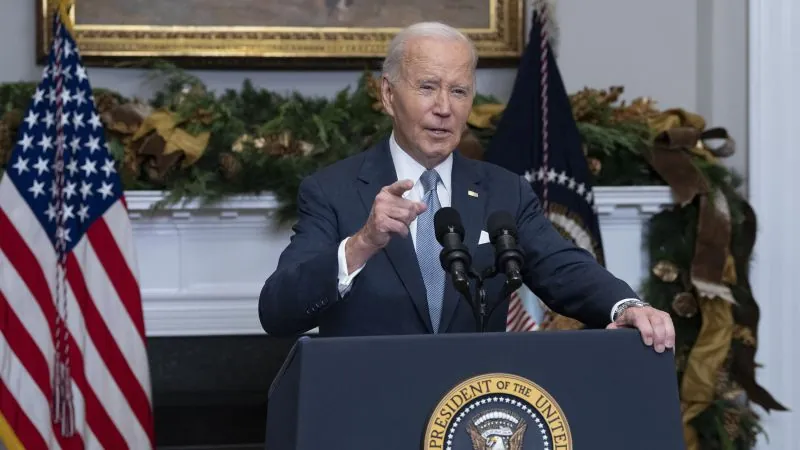
Biden Unveils Comprehensive Strategy for US Engagement in Post-Assad Syria, Orders Airstrikes Against ISIS
2024-12-08
Author: Chun
Biden's Address and Strategic Blueprint
In a significant address on Sunday, President Joe Biden characterized the recent downfall of Bashar al-Assad's regime in Syria as both “a moment of risk” and a “historic opportunity.” Speaking from the White House, Biden outlined the United States' strategic blueprint for aiding the region during this unprecedented transition.
Support for Syria’s Neighbors
Biden emphasized the critical role that the US will play in supporting Syria’s neighbors while ensuring the safety of American personnel as they continue operations against ISIS. He committed to engaging with regional leaders in the upcoming days to facilitate a collaborative effort that will help stabilize Syria and prevent the resurgence of extremist groups.
Airstrikes Against ISIS
Citing the evolving threat posed by ISIS, Biden underscored the urgency of securing detention facilities housing ISIS fighters and conducting targeted “precision strikes” against ISIS positions in Syria. In line with this, US Central Command confirmed that American military assets, including B-52 bombers and F-15 fighter jets, executed over 75 airstrikes against ISIS targets on Sunday.
Response to ISIS Threat
General Erik Kurilla of CENTCOM made it clear that the US will not allow ISIS to exploit the power vacuum created by Assad's collapse. “All organizations in Syria should know that we will hold them accountable if they partner with or support ISIS in any way,” he stated.
Contrast with Trump’s Stance
Biden's remarks came in stark contrast to the stance of President-elect Donald Trump, who criticized US involvement in the Syrian conflict, advocating for a more hands-off approach. With Assad's regime crumbling in the face of a powerful rebel offensive, Trump noted the weakened position of Russia and Iran, both of which had supported the Assad administration. Reports indicated that Assad and his family had found asylum in Moscow.
Impacts of Assad's Collapse
The collapse of the Assad regime marks a dramatic shift after more than a decade of conflict that has tragically led to the deaths of over 300,000 civilians and the displacement of millions, according to UN estimates. Biden expressed a commitment to facilitate a transition toward a new, independent government that represents the diverse populace of Syria.
Humanitarian Aid Commitment
The President also reiterated the US intention to provide humanitarian aid to aid in the country’s recovery, following what he described as a 'generation of brutality.' He emphasized that the nature of this governmental transition will ultimately be decided by the Syrian people themselves, stating, “The United States will do whatever we can to support them.”
Secretary of State’s Position
Moreover, US Secretary of State Antony Blinken affirmed America's position, insisting on the need for an accountable Syrian government that respects the rights of its citizens amidst the ongoing changes. Blinken also highlighted the importance of preserving state institutions and resuming essential services for those affected by the conflict.
Chemical Weapons Management
Biden’s administration is simultaneously prioritizing the assessment and management of the remaining chemical weapons stockpiles in Syria, a critical concern given past reports implicating the Assad regime in their use.
Human Cost of the Conflict
In a poignant reminder of the human cost of the conflict, Biden reiterated his resolve to bring home journalist Austin Tice, who has been missing in Syria since 2012. 'We believe he’s alive. We think we can get him back,' Biden asserted, encouraging those with information to come forward.
Conclusion and Future Outlook
As the world watches this evolving situation, the implications of Biden's actions and statements could resonate far beyond Syria, potentially reshaping the geopolitical landscape of the Middle East for years to come. With rebel leaders claiming victory and promising a new democratic government, the future of Syria hangs in the balance, and the US appears poised to play a crucial role in the outcomes to come.

 Brasil (PT)
Brasil (PT)
 Canada (EN)
Canada (EN)
 Chile (ES)
Chile (ES)
 Česko (CS)
Česko (CS)
 대한민국 (KO)
대한민국 (KO)
 España (ES)
España (ES)
 France (FR)
France (FR)
 Hong Kong (EN)
Hong Kong (EN)
 Italia (IT)
Italia (IT)
 日本 (JA)
日本 (JA)
 Magyarország (HU)
Magyarország (HU)
 Norge (NO)
Norge (NO)
 Polska (PL)
Polska (PL)
 Schweiz (DE)
Schweiz (DE)
 Singapore (EN)
Singapore (EN)
 Sverige (SV)
Sverige (SV)
 Suomi (FI)
Suomi (FI)
 Türkiye (TR)
Türkiye (TR)
 الإمارات العربية المتحدة (AR)
الإمارات العربية المتحدة (AR)